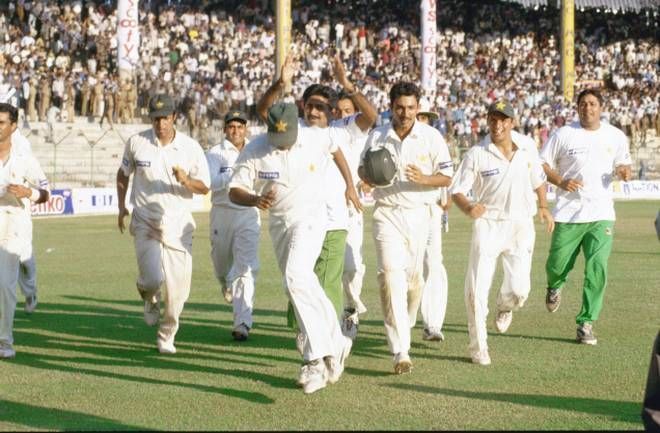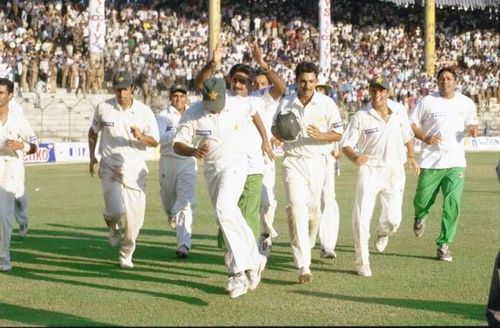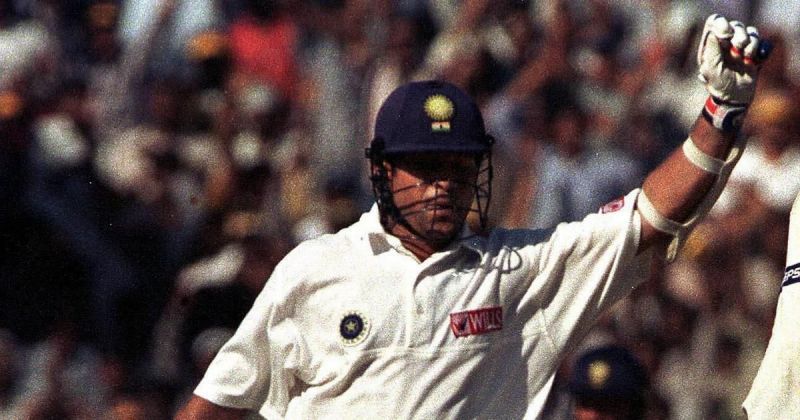
31 Jan 1999: When Sport Triumphed Over Bitter Rivalry

The Gentleman's Game
Every once in a while, cricket proves why it's the ‘Gentleman’s Game’. Some moments transcend victory and defeat, capturing the essence of sport. One such moment is from about 20 years ago.
The 1999 Chennai Test between arch-rivals India and Pakistan was a classic. It was Pakistan's first tour of India in almost 12 years. It lived up to the occasion and also established Chennai’s reputation for being a sporting crowd. Those who first played the game would maybe have had such moments in mind when they wondered about the future of the sport.
Reliving the memory
It was a chilly Sunday afternoon. The power was out and we had be content with listening to the radio commentary. The streets wore a deserted look.
On the field, it was Sachin Tendulkar standing tall against arguably the world's best bowling attack then, led by the trio of Wasim Akram, Waqar Younis and Saqlain Mushtaq at the peak of their prowess. It seemed Tendulkar, with a bat in his hand, was ready.
Test cricket at its best
It wasn’t a promising start to Pakistan’s first innings as they collapsed to 91/5. Mohammad Yousuf (53) and Moin Khan (60) managed to stablise the innings and guided Pakistan to 238. Akram made a useful 38 as well. India started well, getting to a quick 48 for no loss by the end of the first day’s play.
However, India's batting line-up, with the exception of Sourav Ganguly (54), succumbed to the accuracy and guile of the Pakistani bowlers. India folded for 254, gaining only a slender lead of 26 runs.
In the second innings, Pakistan rode on Afridi’s 141 - a blinder of an innings - to set India a challenging target of 271 runs.

The lone warrior
The chase couldn’t have started off worse. India lost both their openers to Waqar with just six runs on the board. But then, on a rapidly deteriorating pitch and with the Pakistani bowlers breathing fire, came in Tendulkar looking to make amends for his first innings. He took charge, but kept losing partners at regular intervals and India were left teetering at 82 for 5.
He was then joined by Nayan Mongia at the crease. The duo stuck together for a 136-run partnership and guided India to a relatively comfortable position. But Mongia threw his wicket away with 53 runs needed to win. Tendulkar battled on but had to deal with his aching back as well. Despite the pain, he executed his shots with precision while painkillers and ice provided him interim relief.
The Heartbreak
With pain threatening to get the better of his patience, Tendulkar decided attack was the only option left and started taking calculated risks. And then came heartbreak. In 92nd over of the innings, he misread a 'doosra' from Saqlain and lofted a miscued shot to Akram. When Sachin was dismissed, India needed only 16 runs more with three wickets left. The team only managed four more before being bowled out.
It was a masterclass of skill, technique, physical endurance and strategy – everything a cricket fan would want. His innings lasted close to 7 hours. Saqlain once even said in an interview that Sachin’s wicket in the 1999 Chennai Test was his my most prized possession.
A Sporting Gesture
Though it was Pakistan who won, post-match scenes at the Chepauk did not indicate this. The crowd, instead of heading home, stayed and cheered the winning Pakistani team as they took a lap of honour. They had come in numbers to support the home team but were still gracious enough to acknowledge that the opponents were better on the day.
It was an unforgettable moment. When the crowd gave a standing ovation to the players of an 'enemy nation', it was proof sport can act as a tool to bridge the gap between two warring nations.
Shaharyar Khan, former PCB Chief and then the Pakistan team manager, wrote in his book 'A Bridge of Peace' that "the positive goodwill that the Chennai crowd emitted surpassed anything that had happened at the popular level in 50 years of Indo-Pak relations”. It was a victory for sport.